Artificial Intelligence人工智能英语演讲
Artificial_Intelligence人工智能(AI)英语演讲

Artificial_Intelligence人工智能(AI)英语演讲Artificial Intelligence: Revolutionizing the FutureIntroduction:Ladies and gentlemen,Today, I stand before you to shed light on one of the most transformative technologies of our time, Artificial Intelligence (AI). It is an honor to deliver this speech on the potential, challenges, and impact of AI in shaping our future. AI, often referred to as the pinnacle of human innovation, carries immense potential to revolutionize various aspects of our lives, from healthcare to transportation, from education to entertainment. With its ever-expanding capabilities, AI has the power to redefine the boundaries of human achievement. So let us delve into the realm of Artificial Intelligence and explore its significance.I. Understanding Artificial Intelligence:Artificial Intelligence is a branch of computer science that focuses on the development of intelligent machines capable of performing tasks that would typically require human intelligence. These tasks encompass problem-solving, learning, speech recognition, decision-making, and much more. AI systems are designed to analyze vast amounts of data, identify patterns, and generate insights, enabling them to emulate human cognitive abilities.II. Applications of Artificial Intelligence:1. Healthcare:AI has the potential to revolutionize healthcare by enabling accurate diagnostics, personalized treatment plans, and drug discovery. Medical professionals can rely on AI systems to analyze patient data, suggest treatment options, and predict disease outcomes. Furthermore, AI-powered robots can assist in surgeries, making procedures more precise and reducing human errors.2. Transportation:The transportation industry is already witnessing the integration of AI technology. Self-driving cars guided by AI algorithms are reducing accidents and improving efficiency. AI also plays a crucial role in optimizing traffic control systems, leading to smoother traffic flow and reduced congestion.3. Education:AI has the power to transform the education sector by personalizing the learning experience for students. Adaptive learning platforms powered by AI algorithms can tailor educational content to individual needs, enhancing engagement and knowledge retention. Additionally, AI-powered chatbots can provide instant support to students, answering their queries and facilitating a seamless learning process.4. Entertainment:AI is revolutionizing the entertainment industry by enabling personalized recommendations, content creation, and virtual reality experiences. Streaming platforms utilize AI algorithms to analyze user preferences andsuggest relevant content. Moreover, AI algorithms can generate music, movies, and art, showcasing the endless possibilities of AI-driven creativity.III. Challenges and Ethical Considerations:While the potential of AI is vast, its development does not come without challenges and ethical considerations. It is essential to address these concerns to ensure that the deployment of AI adheres to ethical standards.1. Job Displacement:AI has raised concerns about job displacement, as automation threatens to replace certain job roles. However, history has shown that technological advancements create new job opportunities as old ones become obsolete. It is crucial to foster a workforce that embraces the changes brought by AI technology through upskilling and reskilling initiatives.2. Data Privacy:AI systems rely heavily on vast amounts of data, raising concerns about data privacy and security. Striking a balance between utilizing data for innovation and safeguarding individuals' privacy rights is of utmost importance. Strict regulations and robust data protection measures are necessary to prevent misuse of personal information.3. Bias and Fairness:AI algorithms are only as unbiased as the data they are trained on. If fed biased or incomplete data, AI systems can perpetuate societal biases. It is crucial to ensure the development of AI systems that are fair, transparent,and accountable. Ethical guidelines and diverse development teams can help address this concern.IV. Conclusion:In conclusion, Artificial Intelligence is an awe-inspiring technology that continues to shape our world. From healthcare to transportation, education to entertainment, the potential of AI knows no bounds. It is essential for us as a society to embrace the opportunities presented by AI while addressing the challenges it poses. By doing so, we can harness the power of AI to create a better and more prosperous future for all.Thank you all for your kind attention.。
人工智能vs人类智慧英文演讲稿
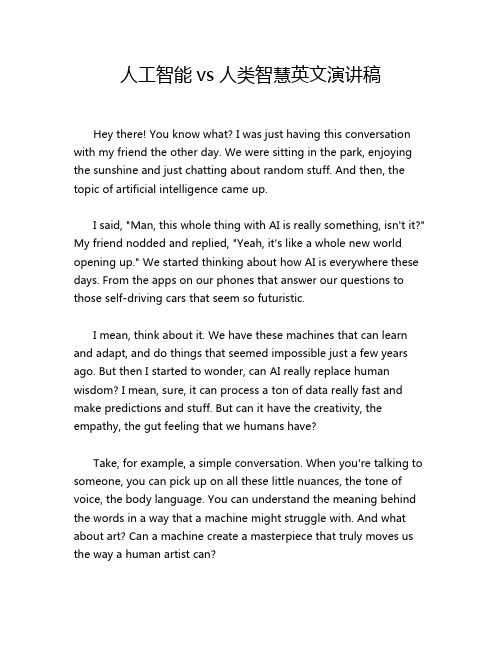
人工智能vs人类智慧英文演讲稿Hey there! You know what? I was just having this conversation with my friend the other day. We were sitting in the park, enjoying the sunshine and just chatting about random stuff. And then, the topic of artificial intelligence came up.I said, "Man, this whole thing with AI is really something, isn't it?" My friend nodded and replied, "Yeah, it's like a whole new world opening up." We started thinking about how AI is everywhere these days. From the apps on our phones that answer our questions to those self-driving cars that seem so futuristic.I mean, think about it. We have these machines that can learn and adapt, and do things that seemed impossible just a few years ago. But then I started to wonder, can AI really replace human wisdom? I mean, sure, it can process a ton of data really fast and make predictions and stuff. But can it have the creativity, the empathy, the gut feeling that we humans have?Take, for example, a simple conversation. When you're talking to someone, you can pick up on all these little nuances, the tone of voice, the body language. You can understand the meaning behind the words in a way that a machine might struggle with. And what about art? Can a machine create a masterpiece that truly moves us the way a human artist can?I remember once when I was at an art exhibition. There was this one painting that just blew me away. The colors, the strokes, it was like the artist had poured their soul onto the canvas. And I just can't imagine a machine being able to do that. It's not just about following a set of rules or algorithms. It's about that spark of creativity, that unique human touch.And then there's decision-making. We humans have this ability to think outside the box, to consider all sorts of factors and make a judgment call based on our experiences and values. Can AI do that? Sure, it can analyze a bunch of data ande up with a rmendation. But will it ever have that sense of morality, that understanding of what's right and wrong in aplex situation?Don't get me wrong, I think AI is amazing. It's opened up so many possibilities and has made our lives easier in so many ways. But I also think we need to be careful. We can't just let machines take over everything. We need to use AI as a tool, not a replacement for our human intelligence.So, in the end, I don't think it's apetition between AI and human wisdom. It's about finding the right balance. Using the power of AI to enhance our lives, while still holding onto what makes us human. Because at the end of the day, it's our humanity that makes us who we are. And that's something no machine can ever take away.。
人工智能应用英语演讲稿范文
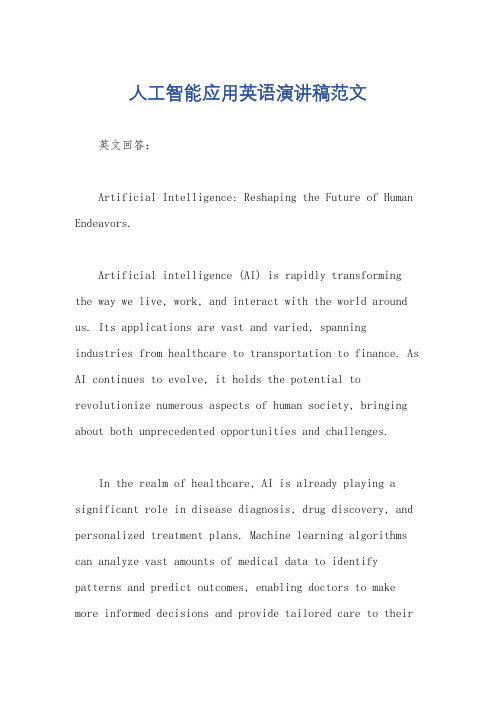
人工智能应用英语演讲稿范文英文回答:Artificial Intelligence: Reshaping the Future of Human Endeavors.Artificial intelligence (AI) is rapidly transforming the way we live, work, and interact with the world around us. Its applications are vast and varied, spanning industries from healthcare to transportation to finance. As AI continues to evolve, it holds the potential to revolutionize numerous aspects of human society, bringing about both unprecedented opportunities and challenges.In the realm of healthcare, AI is already playing a significant role in disease diagnosis, drug discovery, and personalized treatment plans. Machine learning algorithms can analyze vast amounts of medical data to identify patterns and predict outcomes, enabling doctors to make more informed decisions and provide tailored care to theirpatients. AI is also being utilized to develop new drugs and therapies, accelerating the process of drug discovery and bringing innovative treatments to market faster.The transportation sector is another area where AI is making a major impact. Self-driving cars, powered by AI, promise to enhance safety, reduce traffic congestion, and improve accessibility for all. AI is also being used to optimize public transportation systems, making them more efficient and reliable. By leveraging AI, we can create a transportation system that is safer, more accessible, and more environmentally friendly.In the financial industry, AI is transforming risk management, fraud detection, and customer service. AI algorithms can analyze vast amounts of financial data to identify patterns and predict risks, enabling financial institutions to make more informed decisions and mitigate losses. AI is also being used to detect fraudulent transactions in real-time, protecting consumers from financial crimes. Additionally, AI-powered chatbots and virtual assistants are revolutionizing customer service,providing 24/7 support and personalized assistance.Beyond these specific industries, AI is also having a broader impact on society as a whole. AI-powered systems can analyze vast amounts of data to identify patterns and trends, uncovering insights that were previously hidden from human eyes. This has the potential to transform fields such as urban planning, environmental conservation, and social policy. AI can help us make better decisions, allocate resources more efficiently, and create a more sustainable and equitable society.However, the rapid development of AI also raises important ethical and societal concerns. It is crucial to ensure that AI is used responsibly and in a manner that benefits all of society. We must address issues such as job displacement, privacy concerns, and the potential for AI to be used for malicious purposes. By engaging in open and transparent dialogue, we can develop ethical guidelines and regulations that ensure that AI is used for good and notfor evil.中文回答:人工智能,重塑人类事业的未来。
人工智能应用英语演讲稿范文

The Transformative Power of ArtificialIntelligence: An English PresentationLadies and Gentlemen,Today, I am honored to stand here and discuss a topic that is revolutionizing our world - the transformative power of Artificial Intelligence (AI). AI, a field of computer science, aims to create machines capable of intelligent behavior. In recent years, it has made remarkable progress,渗透到 various aspects of our lives, from healthcare to entertainment, education to transportation.In the realm of healthcare, AI has the potential to revolutionize patient care. Machine learning algorithms can analyze vast amounts of medical data to predict diseases and identify effective treatments. For instance, AI-powered diagnostic tools can assist doctors in making accurate diagnoses, leading to earlier interventions and better patient outcomes. Additionally, AI-driven robots are being trained to perform surgical procedures, reducing humanerror and ensuring precision.In the entertainment industry, AI has already begun to transform the way we consume media. Recommendation engines powered by AI analyze our preferences and suggest content tailored to our tastes. This personalization not only enhances our viewing experience but also opens up new revenue streams for content creators. Furthermore, AI-generated art and music are becoming increasingly popular, blurring the lines between human and machine creativity.Education is another area where AI is makingsignificant contributions. Adaptive learning platforms use AI to assess students' progress and adjust learning materials accordingly, ensuring that each student receives personalized instruction. This approach not only improves learning outcomes but also enhances student engagement and motivation.In transportation, AI is revolutionizing the way we move. Autonomous vehicles, powered by AI, are being tested on roads around the world. These vehicles have thepotential to reduce accidents, ease congestion, and improve fuel efficiency. Additionally, AI-enabled smart trafficmanagement systems can optimize traffic flow and reduce commuting times.However, as we embrace the transformative power of AI,it is crucial that we also address the ethical and societal implications. We must ensure that AI is developed and deployed responsibly, considering the potential impact on jobs, privacy, and security. Furthermore, we must ensurethat AI systems are inclusive and do not perpetuate biasesor discrimination.In conclusion, the transformative power of AI isalready evident in various aspects of our lives. It has the potential to revolutionize healthcare, entertainment, education, and transportation, among other sectors. However, as we harness this power, we must also be mindful of the ethical and societal implications. By doing so, we can ensure that AI serves as a force for positive change, benefiting society at large.Thank you.**人工智能的变革力量:英语演讲**女士们、先生们:今天,我非常荣幸能够站在这里,讨论一个正在改变我们世界的主题——人工智能的变革力量。
人工智能英文介绍文章
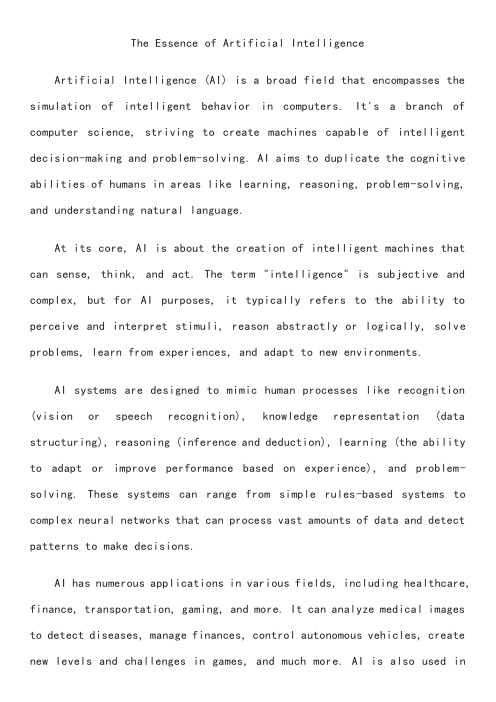
The Essence of Artificial IntelligenceArtificial Intelligence (AI) is a broad field that encompasses the simulation of intelligent behavior in computers. It's a branch of computer science, striving to create machines capable of intelligent decision-making and problem-solving. AI aims to duplicate the cognitive abilities of humans in areas like learning, reasoning, problem-solving, and understanding natural language.At its core, AI is about the creation of intelligent machines that can sense, think, and act. The term "intelligence" is subjective and complex, but for AI purposes, it typically refers to the ability to perceive and interpret stimuli, reason abstractly or logically, solve problems, learn from experiences, and adapt to new environments.AI systems are designed to mimic human processes like recognition (vision or speech recognition), knowledge representation (data structuring), reasoning (inference and deduction), learning (the ability to adapt or improve performance based on experience), and problem-solving. These systems can range from simple rules-based systems to complex neural networks that can process vast amounts of data and detect patterns to make decisions.AI has numerous applications in various fields, including healthcare, finance, transportation, gaming, and more. It can analyze medical images to detect diseases, manage finances, control autonomous vehicles, create new levels and challenges in games, and much more. AI is also used invoice assistants like Siri or Alexa, which can understand and respond to natural language.AI is continuously evolving as technology progresses. Current research is exploring new techniques like transfer learning and deep learning to create more robust AI systems that can handle increasingly complex tasks. As AI matures, we can expect even more profound impacts on society and the world around us.。
学生关于人工智能发言稿英语

学生关于人工智能发言稿英语Ladies and gentlemen,。
Good morning/afternoon/evening! Today, I am honored to stand here and share with you my thoughts on the topic of artificial intelligence (AI) from a student's perspective.Artificial intelligence, also known as AI, has become one of the hottest topics in today's world. It refers to the simulation of human intelligence in machines that are programmed to think and learn like humans. As students, we are witnessing the rapid development and integration of AI in various aspects of our lives, which brings both opportunities and challenges.Firstly, let's explore the positive impacts of AI on education. With the help of AI, personalized learning has become more accessible. Intelligent tutoring systems can adapt to individual students' needs, providing tailored learning materials and feedback. This not only enhances students' learning efficiency but also promotes their engagement and motivation. Moreover, AI-powered educational platforms enable students to access a wide range of resources, such as online courses and interactive learning tools, breaking the limitations of traditional classrooms and textbooks.Furthermore, AI has revolutionized the way we gather and process information. Students now have access to vast amounts of data and knowledge through search engines and AI-powered recommendation systems. This enables us to explore diverse perspectives, deepen our understanding, and foster critical thinking skills. Additionally, AI algorithms can analyze large datasets and identify patterns, helping researchers and students make breakthroughs in various fields, such as medicine, climate science, and social sciences.However, we must also be aware of the challenges and ethical concerns that come with the advancement of AI. One major concern is the potential impact on employment. As AI continues to automate routine tasks, there is a fear that many jobs may become obsolete. It is crucial for students to develop skills that are complementary to AI, such ascreativity, problem-solving, and emotional intelligence, to ensure our future employability.Another ethical concern is the issue of privacy and data security. AI systems rely on vast amounts of data to function effectively. However, the collection and use of personal data raise concerns about privacy infringement. As students, we need to be cautious about sharing personal information online and advocate for transparent and responsible data practices.Moreover, the development of AI also raises questions about its impact on society as a whole. As students, we should actively participate in discussions and debates surrounding AI ethics, fairness, and accountability. It is our responsibility to ensure that AI technologies are developed and used in a way that benefits humanity and respects fundamental rights.In conclusion, as students, we are witnessing the transformative power of artificial intelligence in education and beyond. While AI presents immense opportunities for personalized learning, information access, and scientific advancements, we must also address the challenges it brings, such as job displacement and ethical concerns. It is our role to embrace AI, adapt to its changes, and actively shape its development towards a better future. Let us seize the opportunities, overcome the challenges, and work together to create a harmonious coexistence between humans and AI.Thank you for your attention!。
英语演讲稿The Future of Artificial Intelligence人工智能的未来

The Future of Artificial IntelligenceLadies and Gentlemen,Today, I stand before you to delve into a topic that is not just shaping our present but is also poised to define our future: the future of Artificial Intelligence.Artificial Intelligence, or AI, has evolved from being a mere concept in science fiction to a pervasive force in almost every aspect of our lives. From the smartphones in our pockets to the autonomous cars on our roads, AI is everywhere, and its influence is only growing.In the future, AI is expected to reach unprecedented levels of sophistication and integration. It will not just assist us in menial tasks but will become an integral part of our decision-making processes. Imagine a world where AI-powered systems can predict market trends with pinpoint accuracy, aiding businesses in making smarter investments. Or a scenario where AI-driven healthcare solutions can diagnose diseases at their earliest stages, revolutionizing patient care and outcomes.One significant prediction for the future of AI is the rise of hyper-personalization. As AI systems become more advanced, they will be able to tailor experiences and products to individual needs and preferences with unprecedented precision. From online shopping recommendations to personalized health plans, hyper-personalization will redefine how we interact with technology and services.Another trend is the integration of AI into the physical world, often referred to as the "Internet of Things". In the future, AI will connect various devices and objects, enabling them to communicate and interact with each other. This will lead to smart homes, smart cities, and even smart agriculture, where AI-powered sensors and algorithms optimize resource usage and enhance efficiency.However, this bright future is not without its challenges. As AI becomes more autonomous and powerful, it raises concerns about job displacement, privacy infringements, and even ethical dilemmas. These are issues that we, as a society, must grapple with and find solutions to.To address these challenges, we need to approach AI development with a balanced perspective. We must ensure that AI is developed and deployed in a way that is ethical, transparent, and accountable. This means establishing robust regulatory frameworks that govern AI use and ensure that it benefits society as a whole, not just a select few.Moreover, we need to foster a culture of collaboration between technologists, policymakers, and other stakeholders to ensure that AI is developed responsibly. This includes investing in research that explores the societal impacts of AI and identifies ways to mitigate any negative consequences.In conclusion, the future of Artificial Intelligence is both exciting and uncertain. It offers the potential to transform our world in ways we cannot even imagine yet, but it also poses challenges that we must address head-on. By approaching AI with a balanced and responsible perspective, we can ensure that it becomes a force for good in our world, driving progress and innovation while safeguarding our values andway of life.Thank you.人工智能的未来女士们,先生们:今天,我站在你们面前,深入探讨一个不仅塑造了我们的现在,而且还准备定义我们的未来的话题:人工智能的未来。
人工智能和人类智能英文演讲稿三篇

人工智能和人类智能英文演讲稿三篇我将会谈谈人工智能和人类如何能够共存,但首先,我们需要重新思考人文价值。
所以首先让我承认我价值观中的错误。
那时是1991年12月16日的11时。
我即将首次成为父亲。
我的妻子,申玲,躺在病床上经历着一段艰辛并为时12小时的分娩。
我坐在床边但却焦虑地望着我的手表,而我知道一些她不知道的事。
我知道如果在一小时内,我们的孩子还未出生,我将要将她留在那里并去上班并向我的老板,苹果的首席执行官呈现个有关人工智能的陈述。
幸运的是,我的女儿在11:30出生了--sparingmefromdoingtheunthinkable,andtothisday,Iamsosorryforlettingmyworke thictakeprecedenceoverloveformyfamily.为我免去了要做难以想象的事的需要,而一直到今天,我为我优先工作伦理于对我家人的爱之上感到抱歉。
MyAItalk,however,wentoffbrilliantly.然而,我人工智能的呈现,进行得非常好。
苹果喜欢我的作品,并决定在TED1992上将其宣布,26年前就在这个台上。
我以为我做了在人工智能领域内其中一个最重大的发现,第二天“华尔街日报”也是这么认为。
但随着越来越多的发现,结果是,我并没有发现印度或是美洲。
或许我发现的是葡萄牙附近的一个小岛。
但是人工智能的发现时代持续了下去,而越来越多的科学家全心全意地投入其中。
大约10年前,三名北美科学家做出了重大的人工智能发现,那就是深度学习。
Deeplearningisatechnologythatcantakeahugeamountofdatawithinonesingledomai nandlearntopredictordecideatsuperhumanaccuracy.Forexa深度学习是个能在单一域名中取得大量资料并用超人的精确度来学习以作出预测或决定的科技。
人工智能讲座演讲稿英语

人工智能讲座演讲稿英语Artificial Intelligence Lecture Speech Script。
Good morning, ladies and gentlemen. It is my great pleasure to have the opportunity to speak to you today about the fascinating topic of artificial intelligence. As we all know, artificial intelligence, or AI, has become an increasingly important and influential field in recent years, and its impact on our lives is only set to grow in the future.First and foremost, let's start by understanding what artificial intelligence actually is. In simple terms, AI refers to the ability of a machine to perform tasks that would typically require human intelligence. This can include tasks such as problem-solving, understanding natural language, recognizing patterns, and making decisions. The development of AI has opened up a whole new world of possibilities, from self-driving cars to personalized medical treatments.One of the key aspects of AI that has garnered a great deal of attention in recent years is machine learning. Machine learning is a subset of AI that focuses on the development of algorithms and statistical models that enable computers to improve their performance on a specific task through experience. This has led to significant advancements in areas such as image and speech recognition, natural language processing, and predictive analytics.The potential applications of AI are vast and varied. In the field of healthcare, AI has the potential to revolutionize the way we diagnose and treat diseases, leading to more accurate and personalized care for patients. In the realm of finance, AI is being used to detect fraudulent transactions, optimize investment strategies, and improve customer service. And in the world of manufacturing, AI is enabling the development of smarter, more efficient production processes.However, it is important to acknowledge that the rapid advancement of AI also brings with it a number of ethical and societal considerations. For example, there are concerns about the potential impact of AI on employment, as machines becomeincreasingly capable of performing tasks that were once the domain of humans. There are also questions about the use of AI in decision-making processes, particularly in areas such as criminal justice and national security.In conclusion, the development of artificial intelligence has the potential to bring about significant benefits to society, but it also raises important questions that must be carefully considered. As we continue to explore the possibilities of AI, it is essential that we do so in a thoughtful and responsible manner, taking into account the potential impact on individuals, communities, and the world at large.Thank you for your attention, and I hope that this brief introduction has given you some insight into the exciting world of artificial intelligence. I look forward to discussing this topic further with you.。
人工智能(AI)的英语作文及译文精选五篇
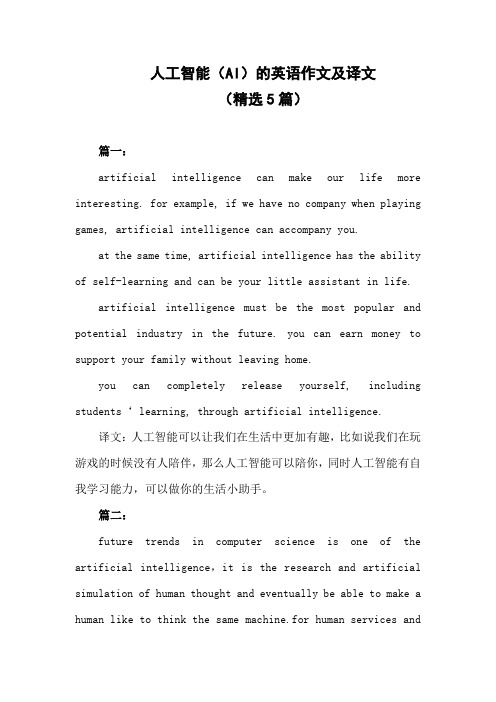
人工智能(AI)的英语作文及译文(精选5篇)篇一:artificial intelligence can make our life more interesting. for example, if we have no company when playing games, artificial intelligence can accompany you.at the same time, artificial intelligence has the ability of self-learning and can be your little assistant in life.artificial intelligence must be the most popular and potential industry in the future. you can earn money to support your family without leaving home.you can completely release yourself, including st udents‘ learning, through artificial intelligence.译文:人工智能可以让我们在生活中更加有趣,比如说我们在玩游戏的时候没有人陪伴,那么人工智能可以陪你,同时人工智能有自我学习能力,可以做你的生活小助手。
篇二:future trends in computer science is one of the artificial intelligence,it is the research and artificial simulation of human thought and eventually be able to make a human like to think the same machine.for human services andto help people solve problems.after all, people thought it was unique, there are feelings, there are a variety of character, this will be very difficult to achieve in the machine.in fact, to do the same as the human thinking machine, the only one of the artificial intelligence, is by no means all. through the study of artificial intelligence, can resolve all kinds of scientific problems, and promote the development of other science, the artificial intelligence is the best!i believe that the science of artificial intelligence is waiting for humanity to explore it step by step the real connotation.译文:计算机科学的未来趋势是人工智能之一,它是对人类思维的研究和人工模拟,最终能够使人类喜欢思考的同一台机器。
人工智能英语演讲稿(优秀范文五篇)
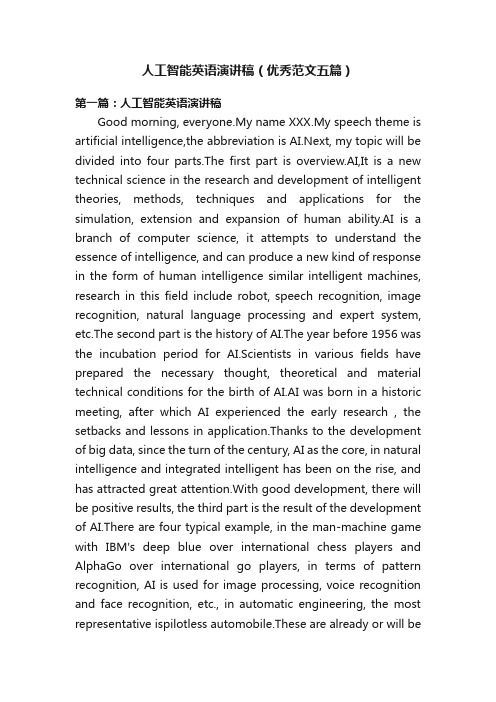
人工智能英语演讲稿(优秀范文五篇)第一篇:人工智能英语演讲稿Good morning, everyone.My name XXX.My speech theme is artificial intelligence,the abbreviation is AI.Next, my topic will be divided into four parts.The first part is overview.AI,It is a new technical science in the research and development of intelligent theories, methods, techniques and applications for the simulation, extension and expansion of human ability.AI is a branch of computer science, it attempts to understand the essence of intelligence, and can produce a new kind of response in the form of human intelligence similar intelligent machines, research in this field include robot, speech recognition, image recognition, natural language processing and expert system, etc.The second part is the history of AI.The year before 1956 was the incubation period for AI.Scientists in various fields have prepared the necessary thought, theoretical and material technical conditions for the birth of AI.AI was born in a historic meeting, after which AI experienced the early research , the setbacks and lessons in application.Thanks to the development of big data, since the turn of the century, AI as the core, in natural intelligence and integrated intelligent has been on the rise, and has attracted great attention.With good development, there will be positive results, the third part is the result of the development of AI.There are four typical example, in the man-machine game with IBM's deep blue over international chess players and AlphaGo over international go players, in terms of pattern recognition, AI is used for image processing, voice recognition and face recognition, etc., in automatic engineering, the most representative ispilotless automobile.These are already or will beapplied in our lives.The last part is about the controversy over the development of AI.Facebook founder mark zuckerberg think humans create machines in order to make stronger than human in some respects, but this does not mean that the machine has the ability to study other aspects beyond human, and tesla CEO elon musk take the opposite point of view, he believes that as long as you think AI will continue to grow, AI will surpass humans, so that we become their pets.From my personal understanding, AI is nothing more than a logic of 0 and 1, which cannot create inspiration, intuition, and feelings.Finally, I want to say is, AI came from step by step exploration and got rapid development, the human need to seize the opportunity of the technological revolution, let the society more intelligent and convenient in the future.That’s all,Thank you.第二篇:《人工智能》英语影评看着昏暗的光影中David和她的妈妈安然睡去,心情渐渐平静下来,或许我们更该从伦理与道德的角度去欣赏这部电影,而不是从科学的角度。
Artificial-Intelligence人工智能(AI)英语演讲

2)With the GPS device,cars can give the shortest possible route to our destination,and also some cars with advanced technology,can drive us to our location when destination is specified;
4) AI helps to entertain us.
• SUMMARY
We can’t deny that, AI is of great importantance nowadays It is created by human beings,and it is not human intelligence
10)And there seems to be lots of examples of AI.
AI can benefit us in the following aspects.
1) AI machines or technology can improve productivity and efficiency;
AI applications:
7)AI can be used in space exploration,and help to collect important information on their own;
8)Some complex expert systems can be developed using AI,which help to make proper decisions;
关于人工智能的英语演讲高中

关于人工智能的英语演讲高中English:Artificial intelligence (AI) is a transformative technology that is reshaping industries and societies worldwide. Its impact is profound, from revolutionizing healthcare and transportation to enhancing productivity in various sectors. However, the ethical implications of AI deployment raise important questions about privacy, bias, and accountability. As we integrate AI into more aspects of our lives, it becomes crucial to ensure that its development is guided by ethical principles that prioritize fairness, transparency, and human well-being. Education also plays a vital role in preparing individuals for an AI-driven future. High schools should incorporate AI literacy into their curriculum to equip students with the knowledge and critical thinking skills necessary to understand AI's capabilities and limitations. Moreover, fostering interdisciplinary approaches that combine AI with fields like ethics, sociology, and policy can help navigate complex issues surrounding AI deployment. Collaboration between governments, industry, academia, and civil society is essential to establish frameworks that promote responsible AI development and mitigate potential risks. By embracing AIresponsibly, we can harness its transformative potential while safeguarding fundamental human values.中文翻译:人工智能(AI)是一项具有变革性的技术,正在全球范围内重塑产业和社会。
人工智能发言稿英语
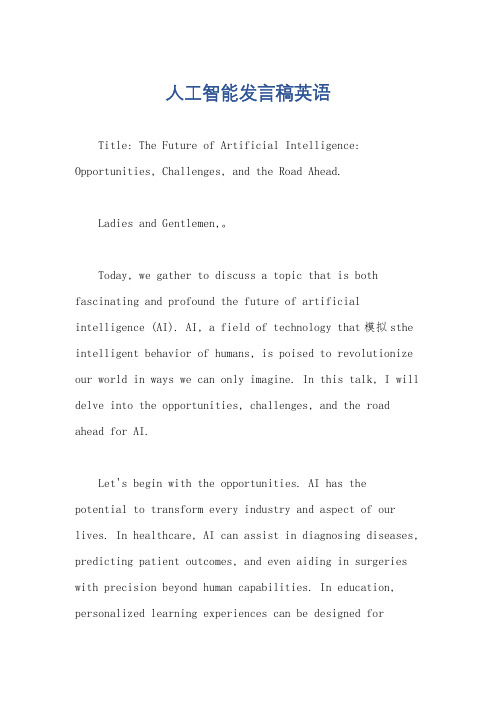
人工智能发言稿英语Title: The Future of Artificial Intelligence: Opportunities, Challenges, and the Road Ahead.Ladies and Gentlemen,。
Today, we gather to discuss a topic that is both fascinating and profound the future of artificial intelligence (AI). AI, a field of technology that模拟sthe intelligent behavior of humans, is poised to revolutionize our world in ways we can only imagine. In this talk, I will delve into the opportunities, challenges, and the road ahead for AI.Let's begin with the opportunities. AI has thepotential to transform every industry and aspect of our lives. In healthcare, AI can assist in diagnosing diseases, predicting patient outcomes, and even aiding in surgeries with precision beyond human capabilities. In education, personalized learning experiences can be designed forstudents, catering to their unique needs and learning styles. In the realm of business, AI can optimize operations, improve decision-making, and enhance customer experiences. The possibilities are endless, and the opportunities are vast.However, with every revolutionary technology, there come challenges. One of the primary challenges with AI is ethical considerations. As AI systems become more autonomous and capable, we must ask ourselves: who is responsible when an AI system makes a mistake? How do we ensure fairness and transparency in AI-driven decisions? These are questions that we must grapple with as we progress in this field.Another challenge is the issue of job displacement. As AI and automation become more widespread, many jobs may become obsolete. It is crucial that we prepare for this transition by investing in education and skills training for the workforce, ensuring that they are equipped to handle the new opportunities that AI creates.Moreover, AI raises concerns about privacy and security. As AI systems collect vast amounts of data to function effectively, the question of data protection and confidentiality becomes paramount. We must ensure that robust data protection measures are implemented tosafeguard against any misuse or breaches.Despite these challenges, the road ahead for AI is bright. We are at the cusp of a new era where AI will playa pivotal role in shaping our future. It is imperative that we approach this technology with an open mind, a spirit of collaboration, and a commitment to ethical principles.To harness the full potential of AI, we need to foster an environment that is inclusive, innovative, and sustainable. We must encourage cross-disciplinary collaboration among industries, academics, and governmentsto ensure that AI is developed in a way that benefitssociety at large.In conclusion, the future of artificial intelligence is filled with both opportunities and challenges. It is up tous to seize the opportunities, address the challenges, and chart a course that leads to a better, more inclusive, and sustainable world. As we embark on this journey, let us remember that AI is not just a tool or a technology; it is a powerful force that has the potential to transform our world for the better.Thank you.。
人工智能的理解之桥发言稿英语
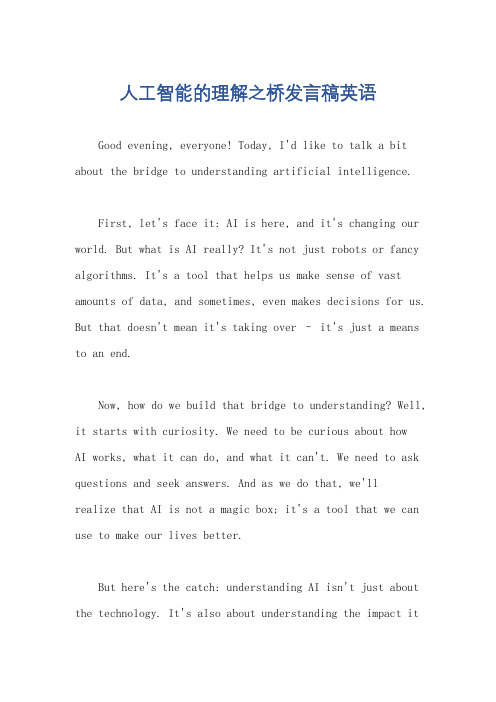
人工智能的理解之桥发言稿英语Good evening, everyone! Today, I'd like to talk a bit about the bridge to understanding artificial intelligence.First, let's face it: AI is here, and it's changing our world. But what is AI really? It's not just robots or fancy algorithms. It's a tool that helps us make sense of vast amounts of data, and sometimes, even makes decisions for us. But that doesn't mean it's taking over – it's just a means to an end.Now, how do we build that bridge to understanding? Well, it starts with curiosity. We need to be curious about howAI works, what it can do, and what it can't. We need to ask questions and seek answers. And as we do that, we'llrealize that AI is not a magic box; it's a tool that we can use to make our lives better.But here's the catch: understanding AI isn't just about the technology. It's also about understanding the impact ithas on society. AI is changing jobs, relationships, and even the way we think. So, as we build.。
